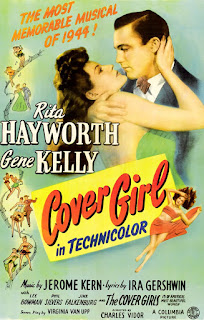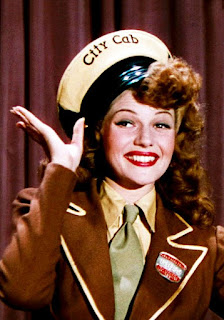As a tardy salute to summer and to the troupes of ambitious young folk who hie themselves off to rural theatres and "thesp" for the bland vacationists, Metro has brought along a passel of its more amiable and talented kids to give out with merriment and music in a Technicolored lark called "Summer Stock." Headed by Judy Garland in high good spirits and health and Gene Kelly in a state of perfection that finds his legs as lithe as rustling corn, this gang is currently to be witnessed on the Capitol's screen, which is not exactly a cow-barn but serves to project the air of same.And we make that remark advisedly, for the locale and focus of most of the film is a nice big red barn on the verdant acres which Miss Garland, in overalls, presumably farms.
Here it is that the talents of a troupe of Broadway aspirants are generously tried and here it is that Miss Garland, of course, has her big chance to shine. Naturally, the little farm girl, who has barely tolerated the venture, saves the show. No summer stock cow barn in New England could be more appropriately employed.As usual in Metro romances having to do with the enterprises Of kids, the activities in this instance are a good bit more fanciful than real. Scriptwriters George Wells and Sy Gomberg have hatched out a rather standard plot which Director Charles Walters has been patient and sometimes tedious in distributing on the screen. The book of a musical comedy should move a little faster than does this. However, that is an opinion which we will not too pugnaciously support.For whenever any of the youngsters in this venture give way to song or dance — and they are eagerly disposed in that direction—joy reigns and the barnyard jumps.
Miss Garland starts the proceedings right away with the cheerful advice to all within earshot of her shower bath that "If You Feel Like Singing, Sing," and then spreads the word among her rural neighbors that a "Happy Harvest" is in store for those who do. Miss Garland, we might state at this point, is in excellent musical form.Then, as soon as Mr. Kelly and his thespians arrive on the scene by the generous invitation of Gloria De Haven, who plays Miss Garland's stage-struck sis, that gentleman and his associates pitch in to do their share, by way of comedy with the farm work but by way of pleasure with the songs. "Dig, Dig, Dig for Your Dinner" is a dandy, gay ensemble piece in which Mr. Kelly and Phil Silvers expend the most energy. These two also do a howling hill-billy comedy skit to a brisk tune called "Heavenly Music," with the happy assistance of assorted dogs.Best spots in the show, however, are a solo dance which Mr. Kelly does to "You Wonderful You," and the finale, "Get Happy," in which all eventually join. Mr. Kelly's dance, accomplished with a newspaper and a squeaky board as props, is a memorable exhibition of his beautifully disciplined style. And "Get Happy" finds Miss Garland looking and performing her best.As Miss Garland's rustic fiancé, Eddie Bracken adds some humor to the plot, and Marjorie Main now and then kicks up a ruckus as a wary and skeptical farm maid. Hans Conried, Nita Bieber and Carleton Carpenter are most conspicuous among the happy gang of shapely and talented thespians who amiably fill out "Summer Stock."One the stage at the Capitol are Hal LeRoy, Phil Foster, Rosita Serrano and Noro Morales and his orchestra.














